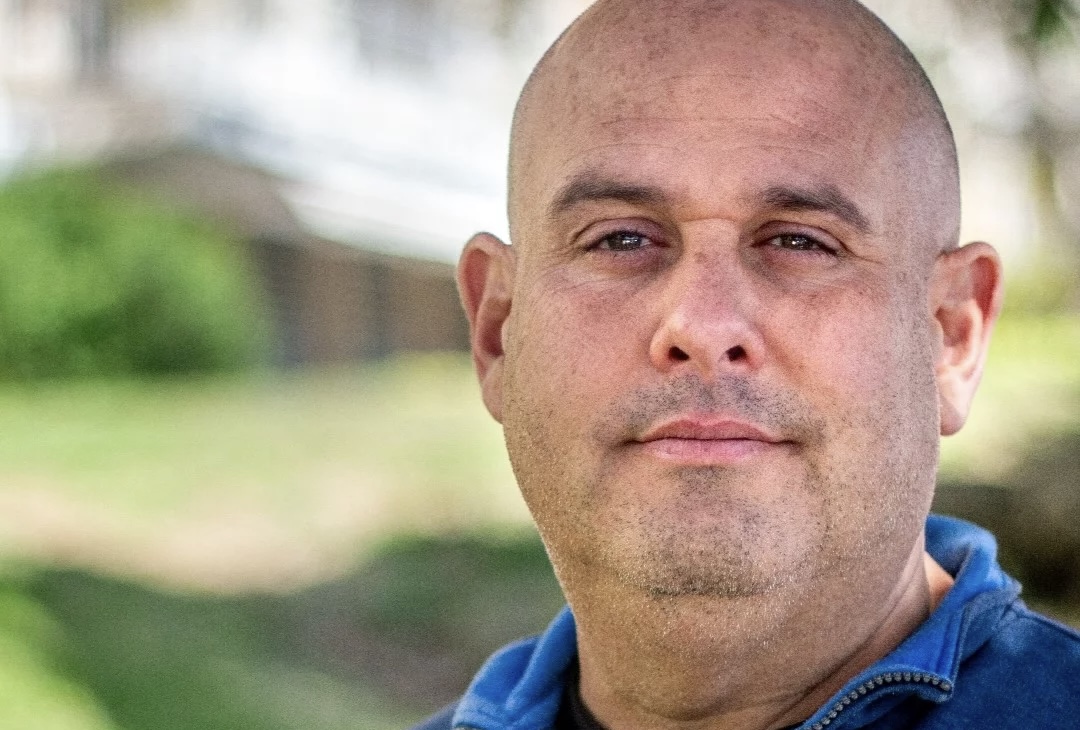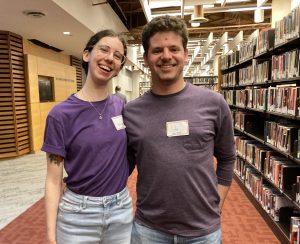Expel the Jews? “Of course,” says Mohammad from Nablus. “No question. They are the enemy. They were brought here so that Europe could get rid of them.”
When it comes to the situation in Israel, Ottawa native Corey Gil-Shuster’s YouTube channel offers something far more horrifying than the usual statistics, political analysis, or GoPro footage—raw, honest answers from Palestinians and Israelis to some of the region’s most disturbing questions.
Since founding The Ask Project back in 2011, Gil-Shuster has created hundreds of videos asking Israelis questions like, “Do you want to nuke Gaza?” Or asking Palestinians, “What do you think of Hitler?” Or asking both groups, “Are you happy?”
Now, with Israel at war, The Ask Project offers a rare, unblinking gaze into the attitudes of typical Palestinians. And while the videos offer no pat solutions—the responses can be uncomfortably raw—they humanize the other side in a way no other media outlet does.
Gil-Shuster’s fascination with human responses to the ongoing conflict is rooted in his aliyah amid the violence of the First Intifada in the early 1990s.
Though he’d attended Jewish schools and camps, Israel came as a surprise. “I expected it to be like New York… very Ashkenazi, very Jewish, like the way I knew about being Jewish.” Instead, he developed what he describes as a love-hate relationship with the chaotic, Mizrachi [Eastern], Middle-Eastern culture that he found here.
When the Second Intifada sent Gil-Shuster back to Canada in the early 2000s with his husband and young child, he wound up working with First Nations groups for Health Canada. Still fascinated by the Palestinian-Israeli conflict, along with parallels for First Nations communities, he ultimately earned a master’s degree in Conflict Studies at University of Ottawa.
There, he led encounter groups between Jews and Arabs. “I didn’t think I was going to make peace… what I love is getting people together and seeing what the dynamics are.”
Those events were like a middle school dance. “The girls are on one side, the boys are on the other side, and no one’s really talking to each other.” Students from the conflict resolution program broke the ice through shared topics like food. “That was a lot of fun, setting up these situations where people would interact.”
Back in Israel in 2011, Gil-Shuster landed in his current position running the international master’s degree program in Conflict Resolution and Mediation at Tel Aviv University.
The Ask Project grew out of his frustration in online discussion forums. “When something is not exactly true, I get really annoyed,” he admits.
People who’d never been to Israel were arguing fiercely based on too little information. “I was like, ‘No, that’s not what’s going on… You’re listening to a Haaretz article. No offense to Haaretz—they do good research—but it’s biased, it’s slanted like all media.’”
“Somebody said, ‘What are you going to do? Go and ask people yourself?’ And it hit me: I have a camera, we have cellphones.”
Someone suggested asking, “Would Israelis accept a one-state solution?” So Gil-Shuster headed out, recording answers from folks in his Tel Aviv neighbourhood ranging from hopes for peace to fears of a Palestinian majority. (The early videos are not as well-produced as his current work.)
Since then, Gil-Shuster has covered every possible topic: abortion, LGBTQ+ and women’s rights, race, religion, nationality, and more. He’s also interviewed subgroups within Israel: settlers, haredim, Arab-Israelis, soldiers, and others.
Approaching Palestinians back in 2011, he thought at first he’d rely on humour. “I thought, I’ll do jokes.” Not that there’s anything funny about tragic situations, he adds. “But maybe we could find a way to laugh together.”
He decided to ask, “Do you want to throw the Jews into the sea?” The ultimate tongue-in-cheek question; a premise so ridiculous nobody would say yes. “I was planning to say, ‘Tell me when to pack… I need to learn how to swim!’”
So he strode into Ramallah and Hebron and started asking. Trouble was, no one laughed. The first person claimed it was all a Zionist conspiracy. Unable to turn that into a joke, he asked another man, who looked Gil-Shuster in the eyes and said, “Of course. They took our land. We cannot be friends.” The third person, smiling broadly, said, “Not to the sea. Slaughter.” (You can still watch that video here.)
That was a wake-up call. Gil-Shuster realized that this was something he’d never seen in either Israeli or foreign media.
Despite the unsettling responses, which he shares unedited in their entirety, humorous notes do often creep into Ask Project videos. And almost every person Gil-Shuster interviews ends up smiling, a testament to his laid-back, faux-naïve style.
Yet Palestinians’ answers underscore massive cultural differences. Simply put, Israelis are open to entertaining ideas of moderation; Palestinians, he’s found, are not.
Among Israeli Jews, Gil-Shuster says, “with most people, you can have a rational conversation and say, ‘Yeah, but if Palestinians were… if Palestinians agreed, would you…?’ And they’re like, ‘Enh, you know what? Maybe.’”
“[While] what I found on the Palestinian side was, ‘No, period. This is our land, it was stolen.’”
Gil-Shuster conducts most interviews in Hebrew and Arabic, with the help of an anonymous Palestinian translator who expertly translates not only words but also cultural concepts. When asking about suicide bombers, for example, she explained that the accepted terminology was ‘martyrdom operations.’
Since the attack by Hamas on Oct. 7, Gil-Shuster hasn’t been back to the West Bank. “My Palestinian friends tell me not to come; it’s too tense. You don’t know how people are going to react.”
Instead, he’s reposting older videos on relevant topics, like one asking West Bank Palestinians why Gazans launch rockets from crowded residential areas.
He’s definitely planning to return, but he’s also realistic about what he’ll find when he gets there. “I’m going have to look these people in the eyes while they tell me that Oct. 7 was a good thing. Because I know they’re going to say that—not all, but a lot of them.”
Indeed, a Dec. 2023 poll reported that 85 percent of West Bank residents were satisfied with Hamas’s role in the war. “I’m absolutely sure it’s true,” says Gil-Shuster.
Meanwhile, within Israel, he says the answers are very different these days. “Oct. 7… unlike any other war we’ve had, very much traumatized Israelis, including myself.”
“Since Oct. 7, I’ve noticed more Israelis—not all, but a lot more—saying, ‘Screw it, we are done. I don’t care if they all die, I couldn’t care less.’ And I don’t mean people, you know, on the [far] right, who had those opinions before.”
Despite his upbeat approach, after so many first-hand interviews, Gil-Shuster is pessimistic about peace. “No hope at all… [Maybe] if the Gulf Arab countries get involved more, which they don’t want to, because they don’t want to deal with Palestinians. They barely want to deal with Israelis; they’re looking for business opportunities, not looking to solve our problems. But if the Arab world can mature and say, ‘Okay, it’s time to be grown ups and accept that Israel exists… I don’t know.”
Even then, there’s still one major roadblock. “You’d have to convince the Palestinians, [who] are sure that any moment now, Israel is just going to fall apart, and all the Jews are going to go back where they came from.
“That’s what they really believe. That’s all of them, even the ones who don’t mind living with us: ‘Israel will fall apart in ten years, one hundred years. We’ll wait. It’s fine.’”
What keeps Gil-Shuster going is hope for Israel’s humanity and the moral high ground. “It’s not going to help me to dehumanize everybody on that side to the extent where I think it’s okay to kill them.”
“I just don’t want to be like them… It scares me to be like them because they say such awful things; they dehumanize Jews to such an extent. They take pleasure in the Jews’ suffering. Not all, but a lot… I don’t want us to be that way. I’m desperately trying to convince Israelis, ‘Don’t do that.’”
The Ask Project videos are available through Gil-Shuster’s YouTube page.







